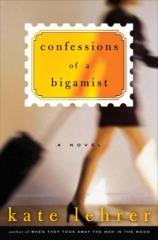Reading Group Guide
Discussion Questions
Confessions of a Bigamist: A Novel

1. Lehrer chooses a Tennessee Williams quote as a prefix to the novel: "What is the victory of a cat on a hot tin roof? I wish I knew...Just staying on it, I guess, as long as she can." What is Michelle's personal "hot tin roof" and do you think she succeeds in staying on it until the end of the novel? If not, what forces propel her to jump down?
2. As young people, Michelle and Steve solidify their relationship over an unexpected pregnancy, only to withstand the tragedy of a miscarriage and a protracted illness that leaves Michelle infertile. How has their sense of surviving bad fortune colored their marriage? Where do you see Michelle still mourning "not just our little child, but all possible future children"? How does this issue complicate Michelle's attitude toward her sister and her late mother–both of whom Michelle sees as un-nurturing and perpetually harried? Is Michelle being more than coy when she calls Daisy Strait Enterprises "my baby to fuss over"?
3. Michelle meets Wilson in front of a Brancusi sculpture of a bird. She is enthralled by the purity of the piece: "The bird embodied simplification, the radical reduction of an idea to its essence." What is the "idea" in Michelle's life that she longs to reduce to its essence? Why does she quickly link Wilson with her desire to pare down her life? Do you think she unfairly stereotypes him (she notices his "bear-cuddly" physique and "blue work shirt" immediately) as the opposite of the sophisticates she surrounds herself with in New York?
4. Steve is both a calming, structural influence in Michelle's life, and a source of low-grade, continual stress. She describes him as "more a pouncer than a pacer...always alert, anticipatory, focused." How has her long partnership with Steve molded Michelle's personality? In what ways does Wilson offer her a different relationship dynamic? Which man brings out the better side of Michelle? If you were a trusted friend of Michelle's, which partner would you steer her towards and why?
5. How does the author use various settings–the sparse New York apartment, the ramshackle Rollins house, the uptight Indiana home, the lavish Amazonian jungle–to explore facets of Michelle's psyche?
6. Michelle Banyon is a sophisticated urbanite with straight hair, flawless designer clothing, subdued makeup, and polished taste who cherishes her privacy and is self-conscious among friends. Daisy Strait is a straight-talking, no-fuss firecracker with a sensible up-do, red lipstick, glasses, and confidence in spades among strangers. Mickey Collins is a spunky, outdoorsy gal with rustic taste in decorating, a hearty appetite, tousled hair, and a mostly-denim wardrobe, who appreciates girl-talk over lunch. Define three aspects of your own personality. Name and describe them.
7. Throughout the novel, Michelle seeks a voice of her own, and an arena in which to be clearly heard. In her New York social circle, she feels peripheral and mute, a mere provider of punctuation marks in our friends conversations. As Daisy Strait, she is articulate, but scripted and predictable, which ultimately leaves her flat. Around Wilson and the Texans, she tends toward dramatic outbursts, uncharacteristic arguments and passionate statements (I have ravenous appetites, I believe in indulgence.) It is a shocking and revelatory discovery, then, when she suddenly realizes that Steve had never heard me speak, nor expressed any interest in doing so. This is a major breakthrough in her analysis of her marriage. Why doesnt she cling to this realization later, when she is struggling so hard to make a decision?
8. Michelle often comments on the pressure of expectation. "My awareness of others' expectations never left me." In her final decision, do you think Michelle is conceding once again to the expectations of others? She meets with both men, planning to first confess to Steve and then say goodbye to Wilson. But Steve's question, "we keep enduring, don't we?" elicits from her the answer, "Yes, we do." And Wilson's exuberant "Mickey, honey! Come home!" results in her running into his arms. Is she pleasing herself first, or them?
9. Lehrer has said that bigamy is a metaphor for ambiguity. Can you think of the ways ambiguity and its resulting tension plays out around you, in our society, in your own life? Think of the tension that often occurs between freedom vs. security, intimacy vs. privacy, kindness vs. truth. Is ambiguity a necessary state?
Confessions of a Bigamist: A Novel
- Publication Date: May 11, 2004
- Hardcover: 288 pages
- Publisher: Crown
- ISBN-10: 1400050251
- ISBN-13: 9781400050253






